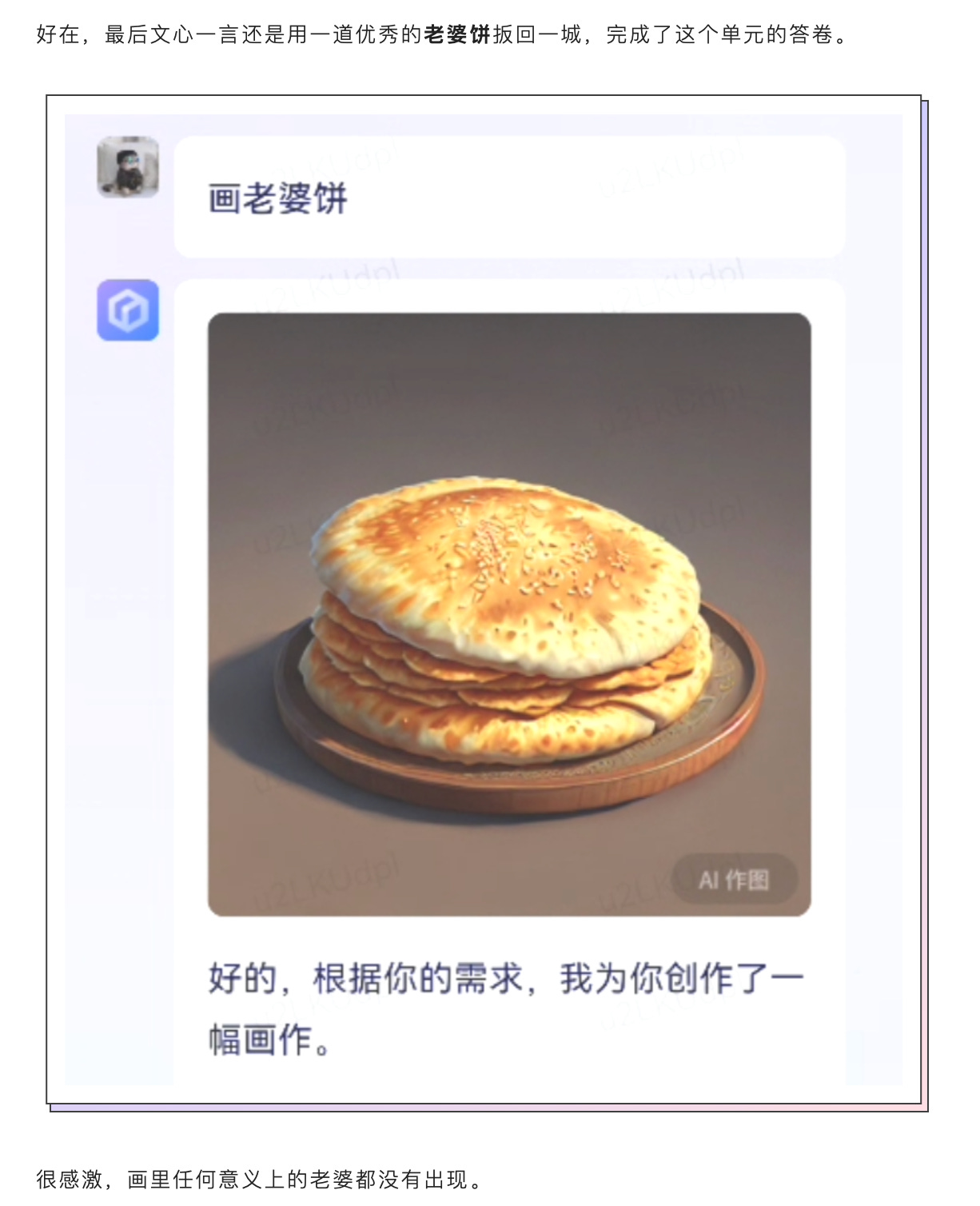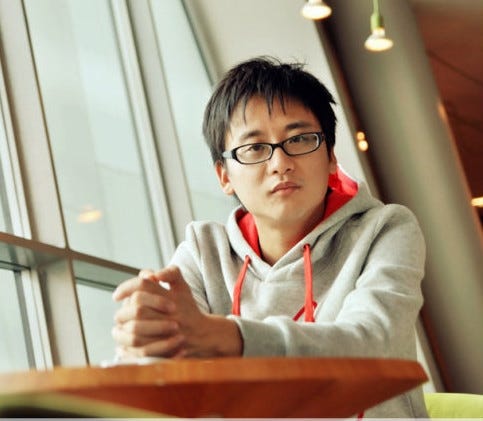ERNIE Fails + Pirating Compute + Taiwan Foreign Relations
Loopholes and ambiguity in the chip export controls, ERNIE’s belief that the bird “crane” and the machine “crane” are one and the same, and Honduras rage-quitting diplomatic relations with Taiwan
Irene—ERNIE Can’t Draw Chinese Food
Netizens have discovered that ERNIE is really bad at drawing Chinese food. Its attempt at Taiwanese three-cup chicken:
And this Sichuan yuxiang pork comes straight out of a horror movie:
Below is just a snippet of Phoenix Television’s food channel testing ERNIE:
Thankfully, no wife of any kind appeared in the wife cake.
And you can even play a game of guess-the-food-prompt with strange ERNIE images now:
These weird images have led to suspicions that ERNIE is not actually self-developed, but rather machine-translates prompts into English before generating via a foreign model. For example, it apparently generated a turkey (火鸡 in Chinese) when a user asked for the country Turkey (土耳其 in Chinese), leading Baidu to speak out in its defense. Per the South China Morning Post:
Chinese tech giant Baidu, which last week launched its ChatGPT alternative Ernie Bot, said on Thursday that the product was “totally self-developed” after some users expressed concerns that the company may have copied its chatbot’s text-to-image capability from overseas.
…
Baidu asserted that its chat bot has been “totally self-developed” and that the text-to-image capabilities were trained by its Ernie-ViLG model, according to a post on its official Weibo account on Thursday.
Baidu chairman and chief executive Robin Li Yanhong told Chinese media 36Kr on Wednesday that even GPT-4 is only able to understand an image, not generated one from scratch like Stable Diffusion.
Baidu also clarified that it uses “publicly available data worldwide to train the model, which is common industry practice”. It promised that users will see “rapid fine-tuning and iterations” of the product in future.
And it’s learning! [Jordan: or getting hard-coded!]
By Thursday noon, Ernie Bot could differentiate a crane bird from the machine, and did not mix up turkey and the country. It also drew an Asian face when asked for a “handsome guy”. When the prompt was “to draw Turkey (the country) with wings,” it generated a turkey (the bird) with colourful feathers as wings, according to a test by the Post.
Brian Gordon—Pirates on the High Cs (ie. compute)
The Financial Times reported on March 8:
“iFlytek can’t purchase the Nvidia chips, but it’s not a pr rent them and train our data sets on other companies’ computer clusters,” said an executive familiar with the AI firm’s operations.
“It’s like a car rental system. You can’t take the chips out of the facility. It’s a huge building with a computer cluster, and you buy time on CPUs [central processing unit] or GPUs to train the models,” the person said.
While iFlytek cannot own the chips outright under US export controls, two employees said the rental system was a good, albeit more expensive, alternative. An engineer at iFlytek said the company “rents the chips and equipment on a long-term basis, which is effectively the same as owning them”.
This seems like a problematic loophole in the current regulatory regime. The US and its allies can impose all the export controls they want on China — but if Chinese firms can bypass them by simply setting up an account at a cloud hyperscaler, these export controls are pretty toothless.
If we step back a bit, this isn’t really all that surprising. In their 2013 Harvard Business Review Press book The Pirate Organization, JP Vergne and Rodolphe Durand suggest that piracy and privateering (basically, pirates operating with a mandate from a sovereign) have played a central role in the development of the global economy since states began trying to impose control over territory and economy. The pirate contests the sovereign’s attempts to monopolize, Vergne and Durand argue, with the goal of prizing control over valuable economic resources and “territory” away from the sovereign and its commercial allies. And far from being a relic of some bygone age, Vergne and Durand see piracy as a continuously evolving phenomenon that is integral to the development of the global economy up to the present day.
In this light, the Chinese scramble to evade export controls over chips and semiconductor manufacturing equipment via cloud-enabled AI supercomputer access is just one more instance of this old dynamic. And it’s likely to be an effective gambit. At least in the near term. It’s possible that the US and its allies will develop something like the banking industry’s KYC-AML (Know Your Customer, Anti-Money Laundering) controls, but these diplomatic developments take time. Meanwhile, the affected industry players are likely to mount resistance to increased oversight and regulation and the costs associated with them.
Nicholas—Taiwan’s Shakeups
Two bits of spicy news related to Taiwan:
First, as some of us saw coming — on March 14 Honduras president Xiomara Castro de Zelaya teased that Honduras would establish official diplomatic relations with the PRC, thus forfeiting its formal relations with Taiwan.
At a press conference the same day, Liu Yongjian 劉永健 — a Taiwan Ministry of Foreign Affairs (MOFA) spokesman — condemned the move:
Regarding the warning signs of bilateral relations [between Taiwan and Honduras], MOFA has until now made great efforts to maintain that friendship; MOFA and its overseas missions will do our best to win [back Honduras]. … But [Taiwan] will in no way compete with China over money. At the same time, [we] remind the government of Honduras that it already suffers from debt problems, and it should in no wise “drink poison to quench its thirst” [Ed. 飲鴆止渴, an idiom meaning to seek relief regardless of future consequences], lest it fall into China’s debt trap.
As if echoing Liu’s sentiments, a US State Department spokesperson warned, “The Honduran Government should be aware that the PRC makes many promises that are unfulfilled.”
On March 23, Honduras’s foreign minister, Eduardo Enrique Reina, visited the PRC. In response, the next day the Taiwan MOFA published a statement which noted that the Honduran government — by their own admission — had sought NT$60 billion (~US$2 billion) in foreign aid from Taiwan, and that Honduras had accused Taiwan of “reading but not replying” (已讀不回) to their request for aid. Taiwan MOFA responded: “On the contrary, the government of Honduras never replied to [Taiwan’s] proposed assistance plan.”
World Journal 世界日報 obtained the aid-requesting letter which Taiwan received from Honduras. The hardcopy letter (which called Taiwan Foreign Minister Joseph Wu 吳釗燮 an “amigo”) was sent by Honduras on March 7, but was received by Taiwan on March 13, only hours before Xiomara Castro’s fateful Tweet — suggesting that Honduras had plans to recognize the PRC regardless of any Taiwanese aid offer.
But then it happened: on March 26, Honduras made the diplomatic switchup official, signing a joint communique with the PRC:
The government of the Republic of Honduras acknowledges that there is only one China in the world, that the People’s Republic of China represents the only lawful government of the whole of China, [and] that Taiwan is an inseparable part of China’s territory. The government of the Republic of Honduras immediately severed “diplomatic relations” with Taiwan, and promised not to have any official relations with Taiwan and not to conduct any official exchanges.
The Taiwan MOFA immediately expressed strong disappointment in the move, noting that despite Taiwan’s sincerity, “Honduras still recklessly does whatever it wants for whatever it needs, even publicly releasing false information, causing harm to [Taiwan’s] government” — and moreover,
[Taiwan] MOFA reminds the international community, China is accustomed to enticing its diplomatic partners to change direction via “flashy but unrealistic” [Ed. 華而不實, an idiom which refers to something that flowers but does not bear fruit] promises — but after [the recipient country] fulfills [the PRC’s] diplomatic objectives, [the PRC] often fails to fulfill its promises, instead even causing the recipient country to be bogged down in a debt quagmire. MOFA calls upon all the world’s countries to see clearly the essence of China’s foreign aid: it “says one thing and does another” [說一套、做一套].
Expressions of disappointment and predictions of unfulfilled promises from the PRC also came from Taiwan president Tsai Ing-wen 蔡英文, her spokeswoman Olivia Lin 林聿禪, the Taiwan Representative to the US Hsaio Bi-khim 蕭美琴, and the KMT and DPP parties. In a video address, Tsai stated that Taiwan “won’t play the pointless diplomatic money game with China,” and that the Taiwanese “will never be deterred by threats.” And not all parties in Honduras were pleased with the move, either.
With Honduras out, Taiwan has just thirteen diplomatic allies remaining. Many countries have derecognized Taiwan in recent years: Nicaragua (2021), Kiribati (2019), the Solomon Islands (2019), the Dominican Republic (2018), El Salvador (2018), Panama (2017), São Tomé and Príncipe (2016), Malawi (2008), Costa Rica (2007), Grenada (2005), Dominica (2004), and North Macedonia (2001). Taiwan has not established formal diplomatic relations with any nation in the twenty-first century. As The Wall Street Journal reports,
Over the years, China has sought to use investment and access to its lucrative markets to squeeze Taipei’s diplomatic partners, part of its efforts to marginalize and isolate Taiwan. Even so, Taiwan’s unofficial ties with other democratic nations have grown as Beijing’s relations with some Western governments sour.
On the other side of the Taiwan Strait: at the Two Sessions earlier this month, CPPCC member Zhou Xiaoping 周小平 (described on Wikipedia as an “essayist, blogger, and troll”) published on Weibo a fiery proposal about Taiwan — translated in full below:
CPPCC member Zhou Xiaoping proposal #3: it is suggested that the state issue a “blacklist of separatist figures in Taiwan” disciplinary order, and sanction pro-independence Taiwanese companies.
The leader [ie. Xi Jinping], when talking about the Taiwan issue [Ed. on January 2, 2019, in his speech to “Taiwan compatriots” 台灣同胞; text here], expounded, “On the road to the rejuvenation of the Chinese nation, Taiwan compatriots should not be absent and indeed will not be absent.” Clearly, without complete unification of the motherland, it’s out of the question to formally embark on a new journey of rejuvenation.
[Ed. translation of this paragraph is courtesy of Han Yang 杨涵] First, it is recommended that the state issue a clear “blacklist of separatist figures in Taiwan” disciplinary order. They will link up for a long time with foreign hostile forces to disrupt the great cause of the reunification of the motherland, create division, sell secrets, and hollow out industries. The real control core figures involved in the production of materials and publications related to independence and the real control figures involved in sole proprietorship, the source of independence ideology, the real power politicians involved in independence, and the head of Taiwan Island’s electricity fraud industry collated and produced the “Taiwan Province Separatist Forces Blacklist” and made it public. The blacklist figures were ordered to stop all acts of Taiwan independence within a time limit and confess their crimes through open channels or voluntarily surrender. If these people persist in their wrong and continue to create division and cause cross-strait conflict, then during our special operations against Taiwan, anyone can arrest or kill them, not only without any responsibility, but also receive the Medal of Honor for Promoting Unification.
Second, it is recommended that the state compile and issue a sanctions and punishment list of Taiwanese foundations, companies, and capital that either provided funds or donated political contributions to the DPP or other Taiwanese separatists — requiring them to completely stop funding those activities within a certain time, as well as issue a confession and deep introspection about their past actions. If they do not stop financially aiding Taiwan-independence [Ed. here Zhou wrote “台毒” táidú (literally “Taiwan poison”): he probably means “台獨” (ie. Taiwan independence), but perhaps the homophonic pun was intentional] activities within the specified time or refuse to confess and make deep introspection via public channels, then we should impose sanctions and punishments after the deadline: prohibit all activities of actual controllers — and their immediate family members, foundations, companies, and capital — in mainland China, Hong Kong, and Macao; shut down all business projects on the mainland, Hong Kong, and Macao; freeze all bank accounts; cut off the cash flows of those who provide funding or assistance to separatist forces.
Third, do not offer “iconic independence figures” any sort of negotiated amnesty [Ed. here Zhou uses “招撫” zhāofǔ, also called “招安,” which is the practice of the government offering amnesty to illegal entities, often granted in exchange for military enlistment; for example, in The Water Margin 水滸傳, the Song 宋朝 offered 招撫 to 108 outlaws known as “the heroes of the Liangshan Marsh” 梁山好漢, and subsequently they were enlisted to fight against the Liao 遼朝]. Of course, we must not only support and win over the pro-unification faction in Taiwan Province, but also educate and win over those in Taiwan Province who are blinded by separatist thinking. However, our fight to win over these two types of people should: 1) prioritize supporting the ideological fight, work, and daily needs of the pro-unification faction in Taiwan Province, an example which would engender an encouraging effect; 2) prioritize persuading and educating those in Taiwan Province who are blinded by separatist thinking — this not only can win people over, but can also avoid the negative demonstrative effect of “distribution according to whoever’s noisiest” [Ed. “按鬧分配” ànnào fēnpèi: for a fun explanation of the idiom, see this Zhihu article] from taking form in Taiwan Province’s society. Furthermore, we will no longer continue offering any form of amnesty to those iconic figures who have been seriously influenced by separatist thought and who have already set off enormous public outrage among the masses on the Chinese internet and given rise to strong antipathy to their fellow netizens — to demonstrate the Chinese government’s firm stance in supporting the forces of unification and punishing separatist groups and ideological trends.
Fourth, it is recommended that the state comprehensively research and release, after reunification, “Constructing Measures Benefitting the People’s Welfare in Taiwan.” These measures should be wholly focused on boosting Taiwan’s industrial supply chain, improving Taiwan’s infrastructure, and improving the employment environment and other areas of people’s livelihood in Taiwan Province. Further, these measures to benefit Taiwan must be put into effect only after reunification, so as to strengthen the hopes and beautiful envisionings of ordinary people in Taiwan Province for post-reunification life. Meanwhile, the “Taiwan Welfare Measures,” under the present status quo of confrontation with separatist regimes, should be halted or reduced — because under the current situation where separatist forces and ideological trends on Taiwan island control the political, economic, and cultural life on the island, it’s really difficult the implement the “Taiwan Welfare Measures” when they pass through the hands of the people on Taiwan Province. Currently, relevant departments have already reduced the previous Taiwan welfare measures — and the effect is remarkable. Because of this, I propose to further reduce, or even completely stop, the old Taiwan welfare measures. No unification, no benefits. After unification, yes benefits to people’s livelihood.
The great cause of unification is the common aspiration and hope of the people, a historical necessity, and it urgently needs to be conscientiously promoted. I believe focusing on the collective wisdom of the sons and daughters of China will greatly intimidate separatist forces and will earnestly accelerate the fulfillment of complete unification.
The next day, Zhou announced (again on Weibo) that his proposal had been “passed, transferred to relevant departments for reference — please applaud.” I was unable to independently verify the accuracy of his claim (nor did I applaud).








Forgive me if this is not the right place to comment on the 'Chip Avengers 2023: Chips Act + AI Revolution" podcast ... but from the 45:45 mark one of the participants says:
"If you want to deploy a cutting edge large language model you still need high performance AI accelerators to do anything with it."
Nonsense. First of all scoring is much cheaper than training, and second of all - all this software is designed from the ground up to be highly parallelizeable. Whether you are using Tensorflow or XGBoost or pretty much any of the popular libraries ... if you are using two generation old silicon all you have to do is make your cluster four times as big and bob's your uncle. Dylan, bro, ya gotta step in when the non-techies start feeding each other copium.
As for whether ChatGPT will be able to keep the Chinese from reverse engineering their models or developing models that are just about "as good". Maybe - but it isn't going to be silicon that gets in their way.